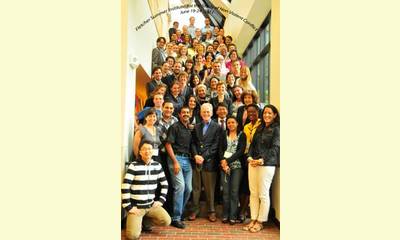|
|
Reflection on Non-violent Training Course, Fletcher School June 2011
an article by Ayman Qwaider
The Fletcher School (FSI) is a setting for radical transformative
empowerment. It's likely that one might say I am exaggerating to start
off my article with such a strong sentence. I have these feelings
because I experienced them being a member amongst real united nations,
full of inspiration and dedication to bring about change needed to be
seen in their realities. Human rights, justice, freedom, aggression,
intimidation, equality are part of the discourses I recognized and
learned about from very experienced activists for freedom, justice,
self-determination and equality.

Participants in the Non-violent Training Course
click on photo to enlarge
I
often think that there are several forms of injustice taking place
cross our globe, but all these forms of injustice result pain and
suffering are at the same level for any nation regardless of its
identity.
Through an intense one week training program on nonviolent
conflict at Fletcher School, I realized that the result of injustices
and oppression are the same regardless of where conflict exists, in
Palestine, Tibet, Colombia, Burma, and these are just a small number of
conflict affected countries. When there is armed conflict, serious
violations of human rights occur, and civilians are significantly the
most to suffer its consequences.
Probably, what helped the most to keep me faithful and hopeful
after being subjected to an enormous number of human rights violations,
is the good people I met in the training course and seeing their
dedication and commitment to being at hand and of assistance for
deprived voiceless people.
Attending the training course on nonviolent conflict at the
Fletcher Summer Institute in Boston was a spark of inspiration which
gives me energy to stay hopeful that justice will prevail. Ordinary
people have absolute power is an overwhelming statement which always
fascinates and empowers me. Having the chance to share real stories from
different parts of world on issues of freedom, equality and justice and
being introduced to various kinds of struggle, has assured me that
people still have power to challenge state power, and people still have
the ability to transform realities through nonviolent resistance.
Attending the FSI training program has widened my perspective
and allowed me to see issues from different angles. Further, it equipped
me with the essential tool of self-empowerment. Nonviolent and civil
resistance will prevail against radical injustices. Knowledge is power
and self-empowerment. Being a part of the FSI has placed a great
responsibility on my shoulders. International Civil society. Throughout
listening to people's testimonies firsthand, I felt the suffering they
were subjected to in their countries. I was moved by certain stories and
highly motivated to end these injustices.
|








|
DISCUSSION
Question(s) related to this article:
Is there a new international generation of human rights activism?
Thematic forum(s) in which this article is being discussed:
HUMAN RIGHTS - DROITS DE L'HOMME
LATEST READER COMMENT:
Waging Non-Violent Action in Violent World
(Reflections on Fletcher International School Course on Strategic Non-Violent Action )
by Imran Khan
“Non-violent refusal to co-operate with injustice is the way to defeat it.” R.M Gandhi
We
live in an extremely violent world. States and transnational non-state
actors use violence to achieve their political and strategic objectives,
believing that use of violence is the most effective way to do so,
notwithstanding that it does not work most of the time. Only the last
decade (2001-2011) saw 9/11 terrorist attacks, a protracted and bloody
war in Afghanistan, the American invasion of Iraq, Israeli aggression
against Lebanon and Palestine, 7/7 bombing in London, terrorist attacks
in Mumbai in 2008 and so on. Literally hundreds of thousands of people
died in these violent conflicts and terrorist attacks. For that matter,
the 20th century was perhaps one of the most violent centuries in human
history, witnessing two world wars responsible for the deaths of
millions of people.
Talking about Pakistan, we are used to
violence in this country. In the weeks and months leading up to the
creation of Pakistan, the sub-continent witnessed mass killings of both
Muslims and Hindus in communal riots.. . ...more.

|
|
|
This report was posted on July 4, 2011.
If you wish to start a new discussion topic on this article, please copy the title of this article which is Reflection on Non-violent Training Course, Fletcher School June 2011 and its number which is 491 and enter this information along with your discussion question and an introductory response to the question here.

A few stories are retained on the main listings if they are considered
by readers to be a priority. If you have not already done so, please
take the time to check a box below: should this article be considered as
a priority?

|








